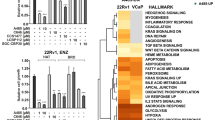Abstract
The objective of this study was to investigate the role of epithelial cell adhesion molecule (EpCAM) in the genesis and the progress of prostate cancer, especially of castration-resistant prostate cancer. Protein expression of EpCAM in ten pairs of prostate cancer tissues and normal adjacent tissues, plus three cell lines, was examined. Short hairpin RNA (shRNA) interference technique was employed to silence the expression of EpCAM in prostate cancer cell LNCaP and construct a stable transfected cell line. In vitro assay was conducted to analyze the effect of EpCAM expression on the expressions of Androgen receptor (AR), Prostate specific antigen (PSA), and cellular proliferation and invasion. EpCAM was found significantly expressed higher in prostate cancer tissues than in normal adjacent tissues. In three cell lines (DU-145, PC-3, and LNCaP), the expression of EpCAM in LNCaP, androgen-dependent prostate cancer cells, was significantly higher than that in the other two. As EpCAM was silenced in LNCaP, the expression levels of AR and PSA obviously descended, and cellular abilities of proliferation and invasion were obviously inhibited.The overexpression of EpCAM has correlation with the genesis of prostate cancer, especially androgen-dependent prostate cancer. As the expression of AR is facilitated, prostate cancer cells’ abilities to proliferate and invade are consequently enhanced.





Similar content being viewed by others
References
Calabrò F, Sternberg CN. Current indications for chemotherapy in prostate cancer patients. Eur Urol. 2007;51(1):17–26.
Higano CS, Crawford ED. New and emerging agents for the treatment of castration-resistant prostate cancer. Urol Oncol. 2011;29(6 Suppl):S1–8.
Petrylak DP. Future directions in the treatment of androgen-independent prostate cancer. Urology. 2005;65(6 Suppl):8–12.
Baeuerle PA, Gires O. EpCAM (CD326) finding its role in cancer. Br J Cancer. 2007;96(3):417–23.
Patriarca C, Macchi RM, Marschner AK, Mellstedt H. Epithelial cell adhesion molecule expression (CD326) in cancer: a short review. Cancer Treat Rev. 2012;38(1):68–75.
Kimura H, Kato H, Faried A, Sohda M, Nakajima M, Fukai Y, et al. Prognostic significance of EpCAM expression in human esophageal cancer. Int J Oncol. 2007;30(1):171–9.
Trzpis M, McLaughlin PM, de Leij LM, Harmsen MC. Epithelial cell adhesion molecule: more than a carcinoma marker and adhesion molecule. Am J Pathol. 2007;171(2):386–95.
van der Gun BT, Melchers LJ, Ruiters MH, de Leij LF, McLaughlin PM, Rots MG. EpCAM in carcinogenesis: the good, the bad or the ugly. Carcinogenesis. 2010;31(11):1913–21.
Spizzo G, Went P, Dirnhofer S, Obrist P, Simon R, Spichtin H, et al. High Ep-CAM expression is associated with poor prognosis in node-positive breast cancer. Breast Cancer Res Treat. 2004;86(3):207–13.
Went P, Vasei M, Bubendorf L, Terracciano L, Tornillo L, Riede U, et al. Frequent high-level expression of the immunotherapeutic target Ep-CAM in colon, stomach, prostate and lung cancers. Br J Cancer. 2006;94(1):128–35.
Poczatek RB, Myers RB, Manne U, Oelschlager DK, Weiss HL, Bostwick DG, et al. Ep-Cam levels in prostatic adenocarcinoma and prostatic intraepithelial neoplasia. J Urol. 1999;162(4):1462–6.
Zellweger T, Ninck C, Bloch M, Mirlacher M, Koivisto PA, Helin HJ, et al. Expression patterns of potential therapeutic targets in prostate cancer. Int J Cancer. 2005;113(4):619–28.
Benko G, Spajić B, Krušlin B, Tomas D. Impact of the EpCAM expression on biochemical recurrence-free survival in clinically localized prostate cancer. Urol Oncol. 2013;31(4):468–74.
Dehm SM, Tindall DJ. Regulation of androgen receptor signaling in prostate cancer. Expert Rev Anticancer Ther. 2005;5(1):63–74.
Li Y, Hwang TH, Oseth LA, Hauge A, Vessella RL, Schmechel SC, et al. AR intragenic deletions linked to androgen receptor splice variant expression and activity in models of prostate cancer progression. Oncogene. 2012;31(45):4759–67.
Grossmann ME, Huang H, Tindall DJ. Androgen receptor signaling in androgen-refractory prostate cancer. J Natl Cancer Inst. 2001;93(22):1687–97.
Eskander RN, Tewari KS. Epithelial cell-adhesion molecule-directed trifunctional antibody immunotherapy for symptom management of advanced ovarian cancer. Clin Pharmacol. 2013;5 Suppl 1:55–61.
Hao H, Zhen Y, Wang Z, Chen F, Xie X. A novel therapeutic drug for colon cancer: EpCAM scFv-truncated protamine (tp)-siRNA. Cell Biol Int. 2013;37(8):860–4.
Gires O, Bauerle PA. EpCAM as a target in cancer therapy. J Clin Oncol. 2010;28(15):e239–40.
Gutheil JC. Novel immunologic and biologic therapies for breast cancer. Curr Oncol Rep. 2000;2(6):582–6.
Sun W, Haller DG. Adjuvant therapy of colon cancer. Semin Oncol. 2005;32(1):95–102.
Frampton JE. Catumaxomab: in malignant ascites. Drugs. 2012;72(10):1399–410.
Conflicts of interest
None.
Author information
Authors and Affiliations
Corresponding author
Rights and permissions
About this article
Cite this article
Xu, Y., Zhao, H. & Hou, J. Correlation between overexpression of EpCAM in prostate tissues and genesis of androgen-dependent prostate cancer. Tumor Biol. 35, 6695–6700 (2014). https://doi.org/10.1007/s13277-014-1892-2
Received:
Accepted:
Published:
Issue Date:
DOI: https://doi.org/10.1007/s13277-014-1892-2




